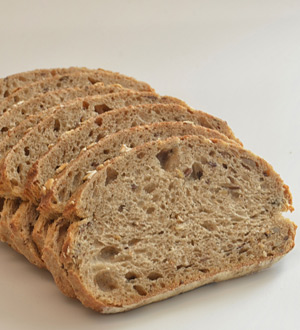
What About Sourdough Bread?
Responses to our recent newsletter article, “Fermented Food?” varied, and among them were these questions about the much acclaimed “sourdough” bread.
Why is sourdough bread “sour”? It is because of its production of, among other things, vinegar (acetic acid)1 as a byproduct of fermentation (see our article on VINEGAR DANGERS here).
How is sourdough bread made? In sourdough bread making, the yeast raising agent of yeast bread is replaced with “starter”.
What is starter, and where does it come from? The internet is replete with instructions on making your own starter from scratch, but suffice it to say that it involves preparing a media on which organisms will grow, exposing that media to organisms from the air, etcetera, and growing them.
What organisms? That depends on what was around in the air when you exposed your media to it. The Bible says “And every open vessel, which hath no covering bound upon it, is unclean.”2
What organisms are considered desirable for starter in sourdough bread. Well, obviously, ones that make the bread rise; ones that make gas. So, if you are looking for a probiotic from bread, you will get a probiotic that makes gas. Do you need a probiotic that makes gas? Oh, excuse me! and usually the gas formers are also alcohol formers, as well as formers of other toxic by-products of fermentation.3
In common with most fermentation processes, sourdough increases the foods content of glutamate, yes free glutamate; the glutamate of “mono sodium glutamate” or MSG. Free glutamate is a neurotoxin responsible for an increase of some cancers.4 [See Previous Newsletter on MSG] The free glutamate in fermented foods (and otherwise) is addictive to our taste buds, so most people prefer foods with it in it. But the MSG problem in processed foods is a whole other topic on its own.
Sourdough bread(s) have drawbacks; it is after all “sour” bread. “Bread should be light and sweet. Not the least taint of sourness should be tolerated. The loaves should be small and so thoroughly baked that, so far as possible, the yeast germs shall be destroyed. When hot or new, raised bread of any kind is difficult of digestion. It should never appear on the table. This rule does not, however, apply to unleavened bread. Fresh rolls made of wheaten meal without yeast or leaven, and baked in a well-heated oven, are both wholesome and palatable.”5
Some cooks don’t give up easily on the making of sourdough bread in preference to yeast breads.
“In regard to your not giving satisfaction, I told you all I had to tell. I can say nothing new. You were as an iceberg in my family. You gave me no confidence, no chance to understand you from the beginning to the close of your staying with me. If you would have taken it kindly, you could have, in some little matters, been helped. But you felt jealous of any suggestions made to improve in some things. In the bread line our family had sour bread a large part of the time, and I, at least, when you returned from Sydney, gave you the privilege of having nothing to do in the kitchen. I would freely give you your board, and you could have your time to prepare for your journey. But you chose to continue in the kitchen.”
"But the breadmaking I transferred to Sara, and then Sister Lucas had it given to her. All have felt much better satisfied. We have had good, sweet bread. All that I condemn myself [for] in this matter is that, to save your feelings, I allowed the sour bread to come on my table so long. It was doing injustice to a large family of workers in order to save you from having sensitive feelings on this subject. I am sure that all that was done in this line to suggest to you improvement was not always done. When I should have done it in justice to my family of boarders. When Sara has, by my request made suggestions about the dough rising, that you should have better bread when the yeast was used, you said it was too much trouble; you would go back to the old practice.”6
Fresh raised (leavened) bread, including yeast bread, should not be eaten fresh. “Bread should be light and sweet. Not the least taint of sourness should be tolerated. The loaves should be small, and so thoroughly baked that, as far as possible, the yeast germs shall be destroyed. When hot, or new, raised bread of any kind is difficult of digestion. It should never appear on the table.”
“Zwieback, or twice-baked bread, is one of the most easily digested and most palatable of foods. Let ordinary raised bread be cut in slices and dried in a warm oven till the last trace of moisture disappears. Then let it be browned slightly all the way through. In a dry place this bread can be kept much longer than ordinary bread, and if reheated before using, it will be as fresh as when new.”
“Bread which is two or three days old is more healthful than new bread. Bread dried in the oven is one of the most wholesome articles of diet.”7
Most commercial bread is baked and then packaged into airtight plastic bags as soon as possible, thus giving no time for the off-gassing of its toxic products and trapping them in the bread.
Is sourdough bread really better tolerated by people suffering with Irritable bowel disease? Not so according to recent scientific studies.8 This same study also discovered that people preferentially choosing sourdough breads experience significantly more feelings of tiredness, joint symptoms, and decreased alertness. So, if you want to avoid feeling tired, having aches and pains in your bones, joints and muscles, having gas, and having difficulty with mental processing, then avoid having sourdough bread as a regular part of your diet.
References
1 Martínez-Anaya MA, Llin ML, Pilar Macías M, Collar C. Regulation of acetic acid production by homo- and heterofermentative lactobacilli in whole-wheat sour-doughs. Z Lebensm Unters Forsch. 1994 Sep;199(3):186- 90.
2 Numbers 19:15 (KJV).
3 Oshiro M, Momoda R, Tanaka M, Zendo T, Nakayama J. Dense tracking of the dynamics of the microbial community and chemicals constituents in spontaneous wheat sourdough during two months of backslopping. J Biosci Bioeng. 2019 Mar 14.
4 Amtha R, Zain R, Razak IA, Basuki B, Roeslan BO, Gautama W, Purwanto DJ. Dietary patterns and risk of oral cancer: a factor analysis study of a population in Jakarta, Indonesia. Oral Oncol. 2009 Aug;45(8):e49-53.
5 White, E. G. (1905). The Ministry of Healing. Mountain View, CA: Pacific Press Publishing Association. p.301.
6 White, E. G. (1896). Lt 11, 1896.
7 White, E. G. (1938). Counsels on Diet and Foods. Washington, D.C.: Review and Herald Publishing Association. pp. 316-317.
8 Laatikainen R, Koskenpato J, Hongisto SM, Loponen J, Poussa T, Huang X, Sontag-Strohm T, Salmenkari H, Korpela R. Pilot Study: Comparison of Sourdough Wheat Bread and Yeast-Fermented Wheat Bread in Individuals with Wheat Sensitivity and Irritable Bowel Syndrome. Nutrients. 2017 Nov 4;9(11).
